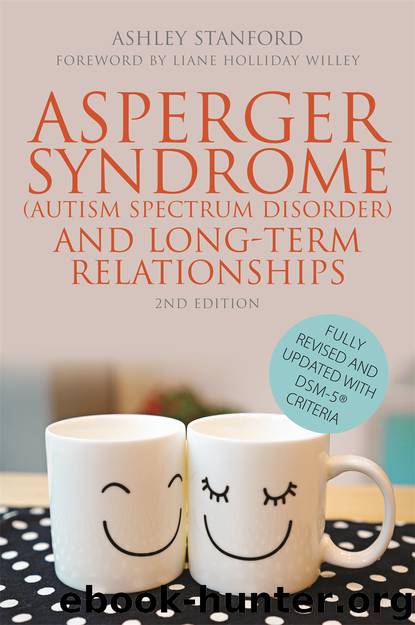Asperger Syndrome (Autism Spectrum Disorder) and Long-Term Relationships by Ashley Stanford

Author:Ashley Stanford
Language: eng
Format: epub
Publisher: Jessica Kingsley Publishers
WHAT IT MAY LOOK LIKE: ROUTINES
“Insistence on sameness, inflexible adherence to routines, or ritualized patterns of verbal or nonverbal behavior…”
When I first read about ASD, this line of the diagnostic criteria made my brain go numb. Routines? What routines? My husband does not do anything nonfunctional… (denial setting in). I needed to read many examples before I was able to recognize the nonfunctional routines that had gently ensconced themselves in our lives. Here is one example that helped me visualize this particular issue:
He [ASD] absolutely must eat his meal a certain way. He starts on one side of his plate and works his way around the plate clockwise, eating certain portions of each food item so that he finishes his plate with a perfect amount of each one left for the final bites. If he gets to the end of his dinner and he’s somehow mismanaged the portions, he’s agitated. There must be exactly enough mashed potatoes to go with the teaspoon of gravy left on the plate.
So what if a person eats funny? It becomes a problem when the routine is inflexible, when doing things differently makes the person nervous or creates anxiety.
Let’s break it down: “Insistence on sameness, inflexible adherence…” A lack of flexibility in any shape or form can cause undue stress and strain on a marriage. Marriage and other long-term commitments to another person require a certain degree of flexibility if both partners are going to move in sync with each other. For example:
When I look at our marriage from a larger viewpoint, I realize that there have been many changes in our lives that my husband [ASD] has not been able to handle because they require him to be flexible—something he’s not. We had kids (who needed lots of help). He lost his job (we had to move). I went back to work (shifting the responsibilities of the housework). It’s part of human progression for everything to change over time, but I keep getting this feeling like my husband is still standing back in the 1970s with his heels dug in deep, wishing things had never changed. He’s holding on to old possessions and old ways of doing things in an effort to stop the changes.
The “inflexible adherence” refers to how a person with ASD will not change the particular behavior in any way, for any reason. For example:
Whenever we go on vacation, my husband has to pack the car a certain way. It doesn’t matter if we’re late—he has to do it his way. If I try to do it, he’ll find a reason to take everything back out of the car and repack it. He has to put certain things in certain spots or, well, I don’t know what would happen. It just isn’t an option to do it any other way.
If you both show inflexibility, you may relate to the following example:
We both have ways of doing things. I have to arrange my books a certain way. He has to keep the computer desk a certain way.
Download
This site does not store any files on its server. We only index and link to content provided by other sites. Please contact the content providers to delete copyright contents if any and email us, we'll remove relevant links or contents immediately.
Doing It: Let's Talk About Sex... by Hannah Witton(8548)
The 5 Love Languages: The Secret to Love That Lasts by Gary Chapman(8494)
Should I Stay or Should I Go? by Ramani Durvasula(6784)
The Road Less Traveled by M. Scott Peck(6633)
The Lost Art of Listening by Michael P. Nichols(6472)
Daring Greatly by Brene Brown(5639)
We Need to Talk by Celeste Headlee(4868)
Beartown by Fredrik Backman(4415)
Men In Love by Nancy Friday(4320)
The State of Affairs by Esther Perel(3926)
The Rules Do Not Apply by Ariel Levy(3905)
How To Win Friends and Influence People by Dale Carnegie(3770)
Reflections Of A Man by Mr. Amari Soul(3700)
The Ethical Slut by Janet W. Hardy(3502)
Algedonic by r.h. Sin(3500)
Pillow Thoughts by Courtney Peppernell(3395)
Finding My Forever by Heidi McLaughlin(3306)
He's Just Not That Into You by Greg Behrendt & Liz Tuccillo(3300)
I Love You But I Don't Trust You by Mira Kirshenbaum(3228)
